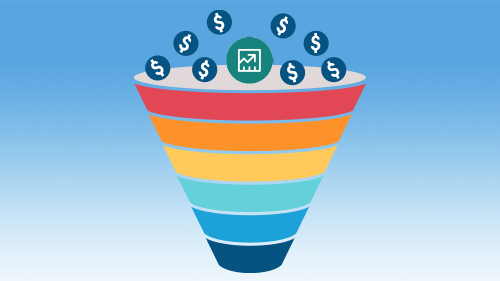Sales Funnel
What is a Sales Funnel?
Definition:
Sales funnel automation refers to the integration of technology, software, and automated processes to optimize and streamline the various stages of the sales process. It encompasses activities from lead generation and prospecting to closing deals and customer retention.
Analogy:
Imagine sales funnel automation as a sophisticated sales assistant. Just as a skilled assistant would handle repetitive tasks, organize customer interactions, and provide valuable insights, sales funnel automation tools take charge of routine sales activities. This allows sales teams to concentrate on strategic selling, building relationships, and maximizing revenue.
Further Description:
Sales funnel automation involves leveraging technology across different facets of the sales journey, including:
Lead Generation and Prospecting: Automated tools can identify potential leads, track their online behavior, and prioritize prospects based on predefined criteria, ensuring that the sales team focuses on the most promising opportunities.
Customer Relationship Management (CRM): Automation in CRM systems helps manage and organize customer data, track interactions, and streamline communication, providing a comprehensive view of the customer journey.
Email Marketing Automation: Sending personalized and targeted emails to leads at various stages of the sales funnel is made efficient through automation. This ensures timely and relevant communication, nurturing leads towards conversion.
Sales Outreach: Automation aids in automating outreach efforts, including follow-up emails, reminders, and even social media interactions, maintaining a consistent and personalized approach.
Quote and Proposal Generation: Automated tools can generate quotes and proposals based on predefined templates, speeding up the process and reducing the chance of errors.
Contract Management: Automating contract creation, review, and approval processes streamline negotiations, making it easier to close deals faster.
Order Processing and Invoicing: Automation extends to order processing and invoicing, reducing manual effort, minimizing errors, and ensuring a smooth transition from deal closure to revenue realization.
Why is Sales Funnel Automation Important?
Efficiency and Time Savings: Automation accelerates the sales process, reducing manual tasks and allowing sales teams to focus on building relationships and closing deals.
Lead Nurturing and Conversion: By automating follow-up processes, sales funnel automation ensures that leads are consistently nurtured, increasing the likelihood of conversion.
Data-Driven Insights: Automation generates valuable data on customer interactions, helping sales teams make informed decisions, identify trends, and refine their strategies.
Improved Collaboration: Sales automation tools enhance collaboration between sales and marketing teams, ensuring seamless alignment in efforts to attract, convert, and retain customers.
Customer Retention: Automation doesn’t end at the sale; it extends to post-sales activities, ensuring ongoing engagement, support, and customer satisfaction.
Examples and Usage:
CRM Systems: Platforms like Salesforce, HubSpot, and Zoho automate customer relationship management, providing a centralized hub for customer data and interactions.
Email Marketing Platforms: Tools like Mailchimp, Marketo, and ActiveCampaign automate email campaigns, delivering targeted messages to leads and customers.
Sales Engagement Platforms: Outreach, SalesLoft, and Groove are examples of platforms automating sales outreach, follow-ups, and communication.
Configure, Price, Quote (CPQ) Software: Solutions like Salesforce CPQ and PROS automate the quote and proposal generation process.
Key Takeaways:
- Sales funnel automation optimizes the sales process, from lead generation to customer retention.
- It includes lead generation, CRM management, email marketing, sales outreach, quote generation, and contract management.
- Benefits include increased efficiency, improved lead nurturing, data-driven decision-making, enhanced collaboration, and improved customer retention.
- Examples of sales funnel automation tools include CRM systems, email marketing platforms, sales engagement platforms, and CPQ software.





